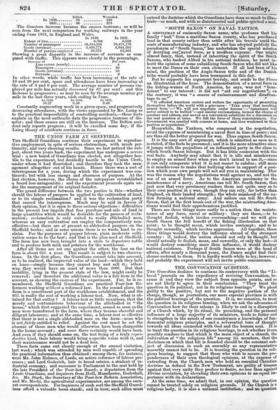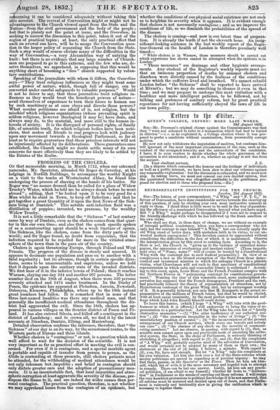THE CONVOCATION QUESTION.
Tin Guardian declines to continue its controversy with the "Li- beral " journals on the expediency of reviving Convocation be- cause it and they view the subject from opposite points and so are not likely to agree in their conclusions. "They treat the question in its political, not in its religious bearings.' We plead guilty to the positive but not to the negative portion of the charge, though, as journalists, our more especial province is with the political bearings of the question. It is, we conceive, to treat the question in its religious bearing, when we ask the advocates of Convocation how far their scheme is likely to end in a disruption of a Church which, by its ritual, its preaching, and the personal influence of a large majority of its ministers, tends to foster and to strengthen in the minds of our countrymen a knowledge of fun- damental religious principles, and a reverential tone of thought towards all ideas connected with God and the human soul. It is to treat the question in its religious bearings, to ask whether it can possibly conduce to that which is the main object of a church, the cultivation of "the religious life" among its members, that the doctrines on which that life is founded should be the constant sub- ject of discussion in such an assembly as any representative assembly cannot fail to be. It is treating the question in its reli- gions bearing, to suggest that those who wish to secure the pre- ponderance of their own theological opinions, at the expense of extruding from the Church men who hold an essential Christian doctrine as defined in the New Testament, are guilty of treason against that very unity they profess to desire, no less than against Divine revelation, by elevating their own opinions to an equal im- portance with its declarations. At the same time, we admit that, in our opinion, the question cannot be treated solely on religious grounds. If the Church is a religious body, it is also a national institution ; and no question calicerning it can be considered adequately without taking this into account. The revival of Convocation might or might not be advantageous to the Church viewed apart from the State and the Nation—from the civil government and the body of the people ; but that is plainly not the point at issue, and the Guardian, in seeking to narrow the discussion to this point, takes it out of the region of practical topics ; at least, the only practical effect that such an avowal can have, will be to merge the Convocation ques- tion in the larger policy of separating the Church from the State. Such a step would of course obviate many of the difficulties in the way of Convocation,—a very Alexandrian way of untying the knot : but there is no evidence that any large number of Church- men are prepared to go to this extreme, and the few who are, de- ceive themselves, we apprehend, in supposing that this would be anything short of becoming a " free " church supported by volun- tary contributions.
Speaking of the journalists with whom it differs, the Guardian says—" They treat religious influences as they might treat some awful power of nature' which, though full of danger, can be converted under careful safeguards to valuable purposes." Would it not be fairer to say, that those journalists treat religious in- fluences as they would treat the beneficent powers of nature— avail themselves of experience to turn their forces to human use by such machinery as at once obeys and directs those powers? What secular politicians are afraid of is, not religion, but the mischief which religious organizations (whose prevailing spirit is seldom religious, however theological it may be) have done, and always may do, to the material, and more still to the human in- terests of society. It is the disregard of personal rights, of family life, of scientific truth, for which religious bodies have been noto- rious, that makes all friends to real progress look with jealousy upon any movement towards a theological Parliament, so far at least as to require guarantees that these priceless interests will not be injuriously affected by its deliberations. These guarantees once established, the Church might no doubt settle many of its own concerns far more effectively than they are likely to be settled by the Estates of the Realm.



























 Previous page
Previous page